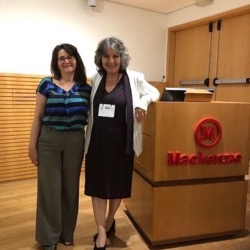I’m happy to post this ebook of papers presented at the10th Screenwriter Stories Seminar: Screenplay-X at the Université Presbytériènne Mackenzie in São Paulo, Brazil.

I gave the opening lecture entitled, “Why Researching Screenwriters (has Always) Mattered” which appears here in English, though the rest of the papers (naturally) are in Portuguese. It was an honor to be asked to do the lecture and privilege to spend time with Professor Glaucia Davino and her students who made me feel very welcome in their city.
Words matter. Writers matter and women writers matter in this world. It is important to consider writers because the word writer comes before the word director when you describe a filmmaker who can do two things. They are writer-directors, they are not director-writers. That tells us something. The vision of a movie cannot exist without the screenplay. A director cannot direct nothing. There must be an idea. There must be a philosophy. There must be a theme. There must be a story. This proves that the writer is of equal importance. We must remember writers have to be equal partners and I think we realize that without realizing it. When people talk about movies to their friends they don’t say “I loved the camera angle in scene 7.” They quote dialogue from their favorite movies whether they are from a Pixar film or a Disney one, they quote the dialogue and that is the work of the writer. That’s the person who should be given credit, yet often at the start a class I ask students to list their two or three favorite films, who directed those films and who wrote that film. They very often cannot name the person who wrote the film they claim to adore. How can you study to be a writer if you don’t remember writers yourself? Hence the reason to study Screenwriting. Hence researching screenwriters has always mattered.
When actors Frances McDormand won her Oscar for Three Billboards Outside Ebbing Missouri she said of the screenwriter Martin McDonagh, “He did not sketch a blueprint. That’s an insult to a screenplay. He didn’t string together a few words. He wrote, meticulously crafted, a tsunami, and then he allowed his troupe of actors to surf it into the shore.” (https://www.hollywoodreporter.com/news/sag-awards-three-billboards-takes-top-honors-at-a-show-women-took-center-stage-1076726) She credited the writer in a way that many people do not.
Stories – and therefore screenplays and therefore screenwriters — are important because they transmit culture around the world. The United States has had a corner on that market for far too many years but now we’re beginning to see other stories permeate our culture, a good and beneficial thing for a country made of immigrants and the ancestors of immigrants. Stories have always transmitted culture far back to the cave paintings of many ancient cultures, through Gilgamesh, and the griots of Africa. Humans have used stories to move culture forward. Movies are the most current version of doing that so why do we forget to study the storytellers? Now is the time to fix this glaring omission both in casual discussions of films and in academia.
Read and Download The Entire Why Researching Screenwriters (has Always) Mattered Presentation in PDF Format
Watch the the entire presentation here
Photos from the event





![14 Charlie Brackett from Why Researching Screenwriters (has Always) Mattered [Video] (54 seconds)](https://rosannewelch.com/wp-content/uploads/2020/06/rmw-sao-paolo-14.jpeg)
![13 Who Tells Your Story from Why Researching Screenwriters (has Always) Mattered [Video] (28 seconds)](https://rosannewelch.com/wp-content/uploads/2020/06/rmw-sao-paolo-13.jpeg)
![12 Who Wrote What? from Why Researching Screenwriters (has Always) Mattered [Video] (1 minute 9 seconds)](https://rosannewelch.com/wp-content/uploads/2020/06/rmw-sao-paolo-12.jpeg)
![11 Marion E. Wong & Jennie Louise Toussaint from Why Researching Screenwriters (has Always) Mattered [Video] (27 seconds)](https://rosannewelch.com/wp-content/uploads/2020/05/rmw-sao-paolo-11.jpeg)
![10 Oscar Micheaux from Why Researching Screenwriters (has Always) Mattered [Video] (43 seconds)](https://rosannewelch.com/wp-content/uploads/2020/05/rmw-sao-paolo-10.jpeg)
![09 Susan Y. Mason from Why Researching Screenwriters (has Always) Mattered [Video] (47 seconds)](https://rosannewelch.com/wp-content/uploads/2020/05/rmw-sao-paolo-09.jpeg)
![08 Jeannie Macpherson from Why Researching Screenwriters (has Always) Mattered [Video] (1 minute 3 seconds)](https://rosannewelch.com/wp-content/uploads/2020/05/rmw-sao-paolo-08.jpeg)
![07 Storytelling And Unreliable Narrators from Why Researching Screenwriters (has Always) Mattered [Video] (1 minute 30 seconds)](https://rosannewelch.com/wp-content/uploads/2020/04/rmw-sao-paolo-07.jpeg)
![06 Stories Are Important! from Why Researching Screenwriters (has Always) Mattered [Video] (51 seconds)](https://rosannewelch.com/wp-content/uploads/2020/04/rmw-sao-paolo-06.jpeg)